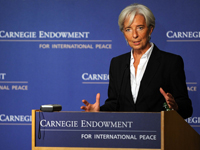Registration
Thank you!
You will receive an email confirming your registration.
On November 12, France will assume the twelve-month rotating presidency of the G20. Carnegie hosted Christine Lagarde, France’s minister for economy, industry, and employment, for a discussion of France’s goals and agenda for the G20. Carnegie’s Douglas Paal moderated.
G20 Achievements
Since 2008, when French President Nicolas Sarkozy and then-U.S. President George W. Bush streamlined the organization, the G20 has become one of the key bodies in addressing the global financial crisis, Lagarde asserted. It is the first economic organization composed of leaders who represent 85 percent of the global GDP. She listed some of its chief achievements thus far:
- Rescuing the Financial System: The G20 responded to the liquidity crisis, rescuing the global financial system that was on the verge of collapse through an extensive stabilization package valued at 700 billion euros in May 2010.
- Balancing growth: The G20 sought to address negative growth and unemployment by establishing a framework for balanced growth. Its members adopted these policies, operating on a relatively collective basis.
- Avoiding Protectionism: The organization took steps to avoid protectionism, which would have been the worst possible result of the crisis, Lagarde asserted.
- Supporting the IMF: The G20 tripled the International Monetary Fund’s (IMF’s) resources, reinforced its prominence, enlarged the IMF’s board, and contributed to development in the least developed countries (LDCs).
- Providing Safety Nets: The current G20 president, South Korea, has done valuable work on developing financial safety nets and ways for countries to respond to liquidity crises, Lagarde added.
French Priorities for the G20
- International Monetary System: The current system is ineffective and inefficient, Lagarde stated. Insufficient coordination among nations, in conjunction with a plethora of currencies and capital flows, undermines the global economy. Lagarde described three aspects of this problem that need to be resolved:
- Capital Flows: Protect LDCs against volatile and uneven capital flows which damage their fledgling economies and can undermine the value of their currency.
- Diversify the Monetary System: The current lack of diversification causes risk, Lagarde argued.
- Monetary Regulation: Nations should better coordinate their monetary policies. The G20 will explore options for better monetary regulation. Lagarde emphasized the need to approach this challenge without allowing preconceived strategic preferences to dictate the path forward.
- Capital Flows: Protect LDCs against volatile and uneven capital flows which damage their fledgling economies and can undermine the value of their currency.
- Commodity Prices and Massive Financialization: Speculating on the futures of commodities has proven dangerous, given their tendency to fluctuate widely. The volume of derivative products based on raw materials is unnerving, Lagarde added. She suggested that price setting should be a more transparent process. She also argued that derivatives need to be studied and their mechanisms better understood.
- Organization in G20: The G20 has been highly effective in times of crisis, Lagarde argued. She asserted that determining how to maintain its momentum and ensure its continuing vitality is imperative:
- Size: The G20 is efficient because of its size, its process for decision-making, and its ability to communicate decisions.
- Representation: While its current size aids its mission, the G20 must find a way to improve representation, giving more countries a seat at the negotiating table without sacrificing efficiency.
- Coordination: The G20 would be well served by better coordination with the World Trade Organization (WTO), Organisation for Economic Co-operation and Development (OECD), the International Labor Union, and the IMF. These ties should be streamlined.
- Size: The G20 is efficient because of its size, its process for decision-making, and its ability to communicate decisions.
- Least Developed Countries: The G20 should develop a comprehensive and effective multi-year plan to better assist LDCs over the long term, Lagarde asserted. Such a plan should be based not just on financial instruments (e.g., flexible credit lines), but include other mechanisms to promote growth:
- Lending terms and conditions should be written in a way that makes them useful for promoting development. Furthermore, the plan should address conditionality.
- Financial transaction taxes should come into play. Innovative sources of financing – for instance on currency transactions – offer an encouraging option.
- The G20 should ensure it is delivering on promises of regulation and supervision stemming from the G20 summits in Pittsburgh, Toronto, and London.
- Lending terms and conditions should be written in a way that makes them useful for promoting development. Furthermore, the plan should address conditionality.
